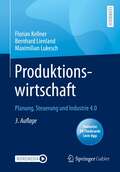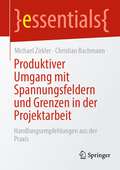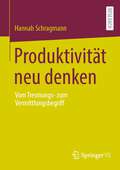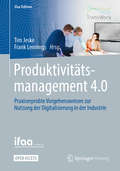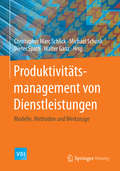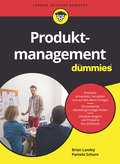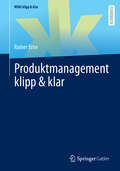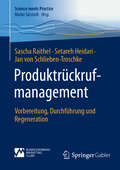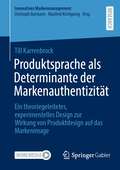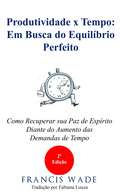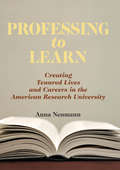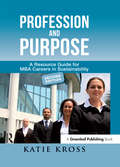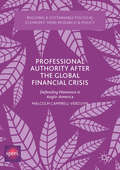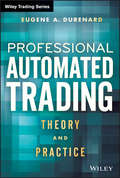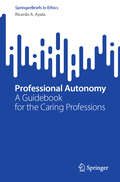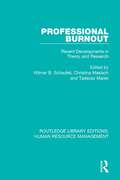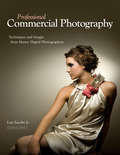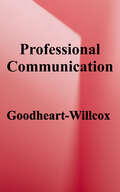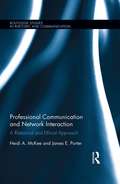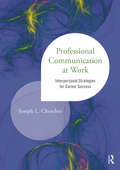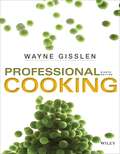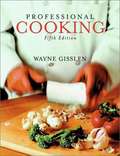- Table View
- List View
Produktionswirtschaft: Planung, Steuerung und Industrie 4.0
by Florian Kellner Bernhard Lienland Maximilian LukeschDieses Buch bietet eine einsteigerfreundliche Einführung in die für industrielle Betriebe maßgebliche Aufgabe der Produktionswirtschaft. Im Zentrum steht dabei das operative Produktionsmanagement. Hierzu gehören die erfolgswirksame Bewirtschaftung der Produktionsfaktoren Mensch, Betriebsmittel und Material, der Einsatz von Information sowie die Planung und Steuerung der industriellen Produktion. Mithilfe zahlreicher Unternehmensbeispiele und Übungsaufgaben wird der Leser durch produktionswirtschaftliche Grundlagen sowie durch Ablauf und Inhalt zentraler Prozesse in der Industrie geleitet. Auch die aktuelle Diskussion um das Thema Industrie 4.0 und cyber-physische Produktionssysteme werden lesefreundlich und mit konkretem Anwendungsbezug präsentiert.Zusatznutzen: Laden Sie die Springer Nature Flashcards-App kostenlos herunter und überprüfen Sie Ihr Wissen mit 400 Aufgaben.
Produktiver Umgang mit Spannungsfeldern und Grenzen in der Projektarbeit: Handlungsempfehlungen aus der Praxis (essentials)
by Christian Bachmann Michael ZirklerProjektleitende erleben vielfältige Spannungsfelder in ihrer Arbeit und sind dabei besonders exponiert. Das Buch erklärt die verschiedenen Spannungsfelder, denen Projektverantwortliche ausgesetzt sind und zeigt, wie ein nachhaltiger Umgang über Grenzmanagement gelingen kann, damit die anspruchsvolle Aufgabe mit Freude, Erfolg und bleibender Gesundheit erledigt werden kann. Praktische Hinweise zur produktiven und nachhaltigen Gestaltung der Projektleitungsrolle werden aus Sicht der Praxis vorgestellt.
Produktivität neu denken: Vom Trennungs- zum Vermittlungsbegriff
by Hannah SchragmannDer Begriff der Produktivität findet täglich Verwendung, um die eigene Leistung zu bewerten. Darin, so die These, zeigt sich ein problematisches Verhältnis zur eigenen Tätigkeit. Denn was bedeutet Produktivität? Die Autorin geht von dem antiken weiten Verständnis von Produktivität als generellem Wirkprinzip aus und zeigt, wie sich Vorstellungen in Bezug auf das, was als produktiv gilt, gewandelt haben. Heute dominiert das ökonomische Verständnis, das die Beziehung zwischen Input (hervorbringender Natur) und Output (hervorgebrachter Natur) quantifiziert. Produktiv ist der Mensch, wenn er viel schafft – und nicht, wenn er ‚sich hervorbringt‘. Die Autorin entwickelt einen neuen Produktivitätsbegriff, der die menschliche Fähigkeit zu produktiver Selbstwerdung ins Zentrum stellt. So entsteht auch ein neuer Blick auf (humanistisch) produktive Arbeit, der diese nicht an Effizienzmaximen, sondern der Beziehung des Subjekts zur Tätigkeit festmacht. Zugleich soll Systemproduktivität im Subjekt verwurzelt werden: Das (wirtschaftliche) System gilt nicht mehr als produktiv, wenn es kurzfristig Gewinne, sondern nur, wenn es langfristig Bedingungen für Individual(re)produktivität bereitstellt. Der Begriff der Produktivität wird so (wieder) als Vermittlungsbegriff fruchtbar gemacht.
Produktivität von industriellen Dienstleistungen in der betrieblichen Praxis: Methodik, Dogmatik und Diskurs
by Uwe Cantner Angelika C. Bullinger-Hoffmann Heiko BreitIm vorliegenden Sammelband werden die Einsatzfähigkeit von Verfahren und Methoden der Produktivitätsmessung in produktionsnahen Dienstleistungsbereichen diskutiert sowie Praxis-/Fallbeispiele zur Messung und Steigerung der Produktivität in der Unternehmenspraxis vorgestellt. Die Vorgehensweise ist interdisziplinär und integriert arbeitssoziologische, betriebswirtschaftliche und arbeitswissenschaftliche, sowie volkswirtschaftliche Ansätze Controllern/Managern, aber auch interessierten Forschern auf dem Feld der Produktivitätsmessung und Managementlehre, wird die Funktionsweise und Wichtigkeit gelebter Produktivitätskultur im effektiven Umgang mit Produktivitätskennzahlen nahe gebracht.
Produktivitätsmanagement 4.0: Praxiserprobte Vorgehensweisen zur Nutzung der Digitalisierung in der Industrie (ifaa-Edition)
by Frank Lennings Tim JeskeIn diesem Open-Access-Buch sind aktuelle Praxisbeispiele und Handlungsempfehlungen zur Gestaltung von Arbeit und Produktivität in der digitalisierten Welt beschrieben. Die Beispiele wurden von Unternehmen und wissenschaftlichen Instituten in mehreren Forschungsprojekten entwickelt und in der Praxis erprobt. Jedes Praxisbeispiel umfasst konkrete Bedarfe und Ziele, ein schrittweises Vorgehen, die Auswirkungen auf die Arbeitsgestaltung und die Produktivität sowie die zu beachtenden Erfolgsfaktoren. So sind aktuelle Gestaltungslösungen für Unternehmen beschrieben, die die Potenziale der Digitalisierung für die Arbeitswelt und das Produktivitätsmanagement praxisnah aufzeigen.
Produktivitätsmanagement von Dienstleistungen: Modelle, Methoden und Werkzeuge (VDI-Buch)
by Christopher Marc Schlick Michael Schenk Dieter Spath Walter GanzDas Buch richtet sich an Dienstleistungsmanager und -planer und beinhaltet ein Kompendium von Modellen, Methoden und Werkzeugen zur Messung, Bewertung und Steuerung der Produktivität von wissensintensiven Dienstleistungen. Neben einer modellbasierten, ganzheitlichen Betrachtung der Produktivität von Dienstleistungen werden die in empirischen Studien identifizierten Stellgrößen vorgestellt und deren Wechselwirkungen in einem System-Dynamics-Modell veranschaulicht. Des Weiteren wird eine Methode zum partizipativen Projektcontrolling eingeführt. Anhand von Fallbeispielen von international agierenden Unternehmen werden innovative Konzepte und Softwareprototypen demonstriert, mit denen auch schwach strukturierte Arbeitsprozesse, wie sie für wissensintensive Dienstleistungen typisch sind, effektiv modelliert, simuliert und optimiert werden können. Die dargestellten Modelle, Methoden und Werkzeuge sollen dem Leser als Unterstützung dienen, komplexe, wissensintensive Dienstleistungen optimal zu planen, während der Erbringung erfolgreich zu steuern und abschließend zu bewerten. Als Innovationsführer in verschiedenen wertschöpfungsstarken Branchen ist Deutschland insbesondere auf wissensintensive Dienstleistungen dringend angewiesen. Die Wettbewerbsfähigkeit der in diesem Segment tätigen Unternehmen ist bei steigendem Lebensstandard der Beschäftigten und einem latenten Mangel an Fachkräften vor allem durch eine Steigerung der Produktivität zu sichern.
Produktmanagement für Dummies (Für Dummies)
by Brian Lawley Pamela SchureKunden haben so eine große Auswahl an Produkten wie nie. Da müssen sich die Unternehmen etwas einfallen lassen, um beim Kunden aufzufallen: die Qualität, das Marketing, der Vertrieb und der Preis - das alles muss ein Produktmanager im Auge behalten, um das Produkt erfolgreich zu machen. Brian Lawley und Pamela Schure stellen alle Aspekte des Produktmanagements vor: die Planungsstrategie sowie den kompletten Produktlebenszyklus von der Marktreife bis zum Ausscheiden aus dem Markt. Sie erklären, wie Sie erste Ideen zu Produkten weiterentwickeln und wie Sie Kunden- und Marktanalysen durchführen. Erfahren Sie außerdem, wie Sie Teams führen und sie zu Höchstleistungen anspornen. Werden Sie so zu einem erfolgreichen Produktmanager, bringen Sie neue Produkte auf den Markt und steigern Sie Ihren Umsatz.
Produktmanagement klipp & klar (WiWi klipp & klar)
by Rainer ErneIn diesem Buch erhalten akademisch und praktisch Interessierte einen konzentrierten und umfassenden Überblick über die wesentlichen Aufgabengebiete des Produktmanagements. Dieser Überblick ist mit zahlreichen Fall- und Praxisbeispielen versehen, damit abstrakte Begriffe und Konzepte anschaulich werden. Übungsaufgaben und Lösungsskizzen helfen den Lesern dabei, die Inhalte nochmals zu rekapitulieren und auf praktische Fälle anzuwenden.
Produktrückrufmanagement: Vorbereitung, Durchführung und Regeneration (Science meets Practice)
by Sascha Raithel Setareh Heidari Jan von Schlieben-TroschkeProduktrückrufe betreffen jedes Jahr weltweit Tausende Produkte, beeinträchtigen Millionen Kundinnen und haben schwerwiegende Konsequenzen für Unternehmen. Ein bekanntes Beispiel ist der Rückruf von Takata-Airbags, der insgesamt 25 Milliarden Dollar kostete und zur Insolvenz der Takata Corporation führte. In einem weiteren Fall schadete ein virales Video, das zeigte, wie ein Kryptonite-Fahrradschloss leicht mit einem einfachen Kugelschreiber geöffnet werden konnte, dem Vertrauen der Kundinnen erheblich. Ein effektives Rückrufmanagement ist daher entscheidend. Es erfordert die Einbindung der gesamten Lieferkette, der Produktion, rechtlicher Aspekte und der Kundenbeziehungen – mit einer zentralen Rolle für das Marketing. Ein gut durchgeführter Rückruf begrenzt den Schaden für das Unternehmen, schützt die Kundinnen und berücksichtigt zugleich die Interessen von Investorinnen, Aufsichtsbehörden, politischen Entscheidungsträgerinnen sowie der Öffentlichkeit. Dieses Buch bietet praktische Leitlinien für die Entwicklung einer Rückrufstrategie, die Kommunikation von Sicherheitsrisiken und die Wiederherstellung von Vertrauen nach einer Krise. Es enthält detaillierte Empfehlungen für das Rückrufmanagement in verschiedenen Phasen, Einblicke in die Konsumgüter-, Lebensmittel- und Automobilindustrie, eine Übersicht zu den Besonderheiten des deutschsprachigen Raums sowie eine Analyse der weitreichenden Auswirkungen von Produktfehlern. Gestützt auf aktuelle Forschung und reale Fallstudien beschreibt dieses Buch umfassend die Werkzeuge, die Managerinnen für eine effektive Steuerung von Produktrückrufen benötigen.
Produktsprache als Determinante der Markenauthentizität: Ein theoriegeleitetes, experimentelles Design zur Wirkung von Produktdesign auf das Markenimage (Innovatives Markenmanagement)
by Till KarrenbrockDas Produkt kann nicht nur als ein passives Objekt für Markttransaktionen gesehen werden. Es muss auch analysiert werden, inwiefern es das Markenimage beeinflussen kann. Obwohl angenommen wird, dass Produktdesign der Hauptgrund für die Liebe zu Marken ist, wurden nur wenige Forschungsarbeiten durchgeführt, die beleuchten, inwiefern Produktdesign die Wahrnehmung auf eine Marke beeinflussen kann. Die beiden dafür notwendigen Disziplinen, Produktdesign und Markenmanagement, werden in der vorliegenden Forschungsarbeit symbiotisch zusammengeführt. Authentische Marken können langfristig höhere Marktanteile verzeichnen und weisen deutlich erhöhte Wachstumsraten auf. Dank ihrer vertrauensbildenden Funktion kann die Markenauthentizität als zentrales Konstrukt für die Differenzierung und Erfolgssicherung von Marken gesehen werden. Im Rahmen der vorliegenden Arbeit wird dargelegt, dass ein vielversprechendes Instrument für die Schaffung einer authentischen Marke in der kommunikativen Funktion von Produktdesign – der Produktsprache – liegen könnte.
Produtividade x Tempo: em Busca do Equilíbrio Perfeito
by Francis Wade Fabiana LouzaDemandas de tempo – elas são um fato da nossa vida moderna. Como você se comporta diante da crescente expectativa de que você deve cumprir com todas as suas obrigações, fazer o trabalho de mais de uma pessoa e lidar com várias informações? Você sabe que as tecnologias só pioram as coisas e não ajudam muito... Como você se mantém tranquilo diante dessa pressão crescente? O Produtividade x Tempo: em Busca do Equilíbrio Perfeito é um livro que fala sobre o aumento da sua capacidade de produzir resultados. Você já deve saber que o tempo não pode ser gerenciado, mas existem diversos hábitos positivos que você usa todos os dias para sobreviver. Para chegar ao próximo nível, onde você se desenvolve, você deve começar pelas suas práticas atuais e aperfeiçoá-las. De acordo com as pesquisas que fiz em várias áreas citadas em mais de 200 referências, não existe uma maneira viável de melhorar o comportamento. Neste livro eu mostro como melhorar seus hábitos, práticas e rituais para que você aumente seu desempenho quando quiser, mesmo tendo obstáculos (como o tráfego) evidentes. Essas ideias e exercícios vão ajudá-lo a aprender no seu próprio ritmo, de uma forma que você nunca vai esquecer.
Professing to Learn: Creating Tenured Lives and Careers in the American Research University
by Anna NeumannResearch, teaching, service, and public outreach—all are aspects of being a tenured professor. But this list of responsibilities is missing a central component: actual scholarly learning—disciplinary knowledge that faculty teach, explore in research, and share with the academic community. How do professors pursue such learning when they must give their attention as well to administrative and other obligations? Professing to Learn explores university professors’ scholarly growth and learning in the years immediately following the award of tenure, a crucial period that has a lasting impact on the academic career. Some launch from this point to multiple accomplishments and accolades, while others falter, their academic pursuits stalled. What contributes to these different outcomes? Drawing on interviews with seventy-eight professors in diverse disciplines and fields at five major American research universities, Anna Neumann describes how tenured faculty shape and disseminate their own disciplinary knowledge while attending committee meetings, grading exams, holding office hours, administering programs and departments, and negotiating with colleagues. By exploring the intellectual activities pursued by these faculty and their ongoing efforts to develop and define their academic interests, Professing to Learn directs the attention of higher education professionals and policy makers to the core aim of higher education: the creation of academic knowledge through research, teaching, and service.
Profession and Purpose: A Resource Guide for MBA Careers in Sustainability
by Katie KrossSustainability holds the promise of an exciting new approach to business – one in which business goals are aligned with social and environmental goals. Multinational corporations are recognizing that we live in an increasingly resource-constrained world, and that more accountability for corporate social and environmental impacts will accrue to them. More importantly, forward-thinking executives understand that sustainability can present new opportunities for competitive advantage – whether that is by reducing costs, minimizing risk, appealing to increasingly conscientious customers, or reaching new markets entirely.With the growth of this field comes a host of interesting new career opportunities for MBAs. As companies are grappling with challenges like how to develop social return on investment (SROI) metrics or understand the potential impact of corporate carbon footprints on stock prices, there are new opportunities for the next generation of managers – managers who are not only trained in traditional MBA fundamentals but also grounded in an understanding of the multifaceted social and environmental challenges facing 21st-century global business leaders. Entirely new career paths are opening to MBAs interested in sustainability: sustainable venture capital, green marketing, corporate social responsibility management, carbon credit trading, and sustainability consulting, to name a few.Perhaps even more than corporate executives, MBA students understand this trend. The next generation of managers can see that the future of business will require a new set of skills and responsibilities. Between 2003 and 2008, membership in Net Impact, the global organization for MBAs and business professionals interested in sustainability, increased more than fourfold. By March 2009, over 130 business schools had a Net Impact chapter. Around the world, MBA students realize that a different model will be required for businesses in the coming decades. The career paths that fall under the broad umbrella of "sustainability" are as diverse as the MBA students themselves. One student may be interested in social entrepreneurship in West Africa, and the next will be seeking advice about clean-tech venture capital careers in Silicon Valley; a third will be interested in greening global supply chains. Corporate social responsibility, sustainable product marketing, microfinance, green real estate development, renewable energy, and other interests all likewise fall under the sustainability umbrella at times. Because of this diversity, it is often hard for business schools' career management centers to address sustainability-related career options in a comprehensive way. Many sustainability-related companies and nonprofits are not accustomed to on-campus recruiting. Others have not historically hired MBAs at all. MBA students and alumni interested in sustainability careers are often left to navigate their own internship and job search paths. And, often, they struggle. Profession and Purpose has been written to address this urgent need. Whether you are focused on an off-campus search or participating in the on-campus recruiting process, there are a host of sustainability-specific career resources you should know about. You'll need to be well versed in sustainability news and trends, and network at the right events, conferences, and company presentations. You also need to know about industry- and discipline-specific websites that post sustainability jobs for positions with titles like Corporate Social Responsibility Manager, Socially Responsible Investing Analyst, and Renewable Energy Market Analyst.Through hundreds of conversations with MBA students, professionals, and recruiters, as well as her own personal experience, the author has compiled the key job search resources and tips for MBAs interested in sustainability careers. The book provides ideas for researching companies, making the most of your networking, identifying job and internship openings, and preparing for interviews. No matter what stage of your MBA career search process you're in, this
Professional Authority After the Global Financial Crisis
by Malcolm Campbell-VerduynThis book challenges amoral views of finance as the leading realm in which mammon - wealth and profit - is pursued with little overt regard for morality. The author details an enhanced ethical emphasis by leading Anglo-American professionals in the aftermath of the 2007-8 global financial crisis. Instead of merely stressing expert knowledge, professionals sought to overcome the alleged impossibility of serving "two masters" - mammon and God - by embracing religious finance, socio-economic inequality, sustainability and other overtly moral issues. Continuities in liberal values and ideas, however, limited the impact of this enhanced ethical emphasis to restoring the professional authority, as well as to more fundamentally reforming of Anglo-American finance following the most severe period of instability since the Great Depression. Providing a nuanced account of post-crisis change and continuity in a crucially important industry, Campbell-Verduyn advances a dynamic, process-based understanding of authority that will appeal to international political economists and sociologists alike.
Professional Automated Trading
by Eugene A. DurenardAn insider's view of how to develop and operate an automated proprietary trading networkReflecting author Eugene Durenard's extensive experience in this field, Professional Automated Trading offers valuable insights you won't find anywhere else. It reveals how a series of concepts and techniques coming from current research in artificial life and modern control theory can be applied to the design of effective trading systems that outperform the majority of published trading systems. It also skillfully provides you with essential information on the practical coding and implementation of a scalable systematic trading architecture.Based on years of practical experience in building successful research and infrastructure processes for purpose of trading at several frequencies, this book is designed to be a comprehensive guide for understanding the theory of design and the practice of implementation of an automated systematic trading process at an institutional scale.Discusses several classical strategies and covers the design of efficient simulation engines for back and forward testingProvides insights on effectively implementing a series of distributed processes that should form the core of a robust and fault-tolerant automated systematic trading architectureAddresses trade execution optimization by studying market-pressure models and minimization of costs via applications of execution algorithmsIntroduces a series of novel concepts from artificial life and modern control theory that enhance robustness of the systematic decision making--focusing on various aspects of adaptation and dynamic optimal model choiceEngaging and informative, Proprietary Automated Trading covers the most important aspects of this endeavor and will put you in a better position to excel at it.
Professional Autonomy: A Guidebook for the Caring Professions (SpringerBriefs in Ethics)
by Ricardo A. AyalaAimed at supporting their emancipatory project, this book explores strategies for resisting dominance and enhancing agency within the caring professions. It helps bridge the gap between theoretical and practical autonomy in these fields, which have long been overshadowed by other professional groups. The book scrutinises the often-misunderstood notion of autonomy, which is frequently equated with mere independence—an equation that can paradoxically undermine, rather than improve, care quality. Additionally, it critiques the prevailing lack of a specific philosophical framework for practice. Existing literature typically approaches professional autonomy through a liberal philosophy lens or loosely assigns moral agency to groups, leading to a view of autonomous professions as analogous to autonomous individuals. By presenting a critical overview of the main schools of thought on autonomy—emphasising group autonomy and the specific challenges faced by caring professions—this book aims to fill a significant gap. It includes case studies to ground its theoretical insights in practical examples from real-world scenarios, helping the caring professions identify both autonomy issues and opportunities for enhancing autonomous practice.
Professional Burnout: Recent Developments in Theory and Research (Routledge Library Editions: Human Resource Management)
by Christina Maslach Tadeusz Marek Wilmar B. SchaufeliA rapidly growing number of people experience psychological strain at their workplace. In almost all industrialized countries, absenteeism and turnover rates increase, and an increasing amount of workers receive disablement benefits because of psychological problems. This book, first published in 1993, concentrates on a specific kind of occupational stress: burnout, the depletion of energy resources as a result of continuous emotional demands of the job. This volume presents theoretical perspectives that had been developed in the United States and Europe, discusses methodological issues, and examines organisational contexts. Written by an international group of leading scholars, this book will be of interest to students of both psychology and human resource management.
Professional Commercial Photography: Techniques and Images from Master Digital Photographers
by Lou Jacobs Jr.Presenting ideas and commentary as well as photographs, this collection offers new photographers revelations and wisdom from professionals and informs them how to achieve commercial success. Commercial photographers create images that are designed to sell products, services, political candidates, organizations, corporations, and any other marketable commodity or idea, and their clients range from advertising agencies, manufacturers, retail stores, hotels, restaurants, and other businesses. With a section focusing on each of these types of services, this reference provides a quick workshop on an area of expertise, furnishing those new to the business with a wide variety of information about each specialty. Tips for selecting the most effective equipment for each subgenre as well as technical information about each camera combine with business-savvy know-how#151;from marketing, bidding, budgeting, building referrals, managing the office, and more#151;making this a comprehensive reference for being both behind and in front of the lens.
Professional Communication
by Goodheart-Willcox PublisherThis book takes an integrated approach to teaching English/language arts skills that are vitally important in today's digital environment. The basic skills of writing, speaking, listening, and reading are interwoven into the content as each skill is presented and applied in context. <p><p>Students are guided through a step-by-step writing process to create clear and concise messages and develop professional skills that are that are sought after in the workplace. Topics such as making presentations, grammar basics, and digital citizenship prepare students for success in college and career and to become effective contributors in the 21st century. <p><p>Writing for specialized purposes, such as technical writing and social media, guides the development of writing expertise needed in today's job market. Portfolio development activities provide an opportunity for students to create a personal portfolio to use when applying for college, a community service position, or a job. <p><p>Exploring Communication Careers features examine a wide variety of opportunities in the Arts, A/V Technology and Communication career cluster. Career planning chapters help students to prepare, apply, and begin the first day on a job.
Professional Communication
by Shikha ShuklaTechnical communications, constituents of technical written communications, their forms and presentation strategies are explained in detail in this volume.
Professional Communication and Network Interaction: A Rhetorical and Ethical Approach (Routledge Studies in Rhetoric and Communication)
by James E. Porter Heidi A. McKeeDigital technologies and social media have changed the processes, products, and interactions of professional communication, reshaping how, when, with whom, and where business professionals communicate. This book examines these changes by asking: How does rhetorical theory need to adapt and develop to address the changing practices of professional communication? Drawing from classical and contemporary rhetorical theory and from in-depth interviews with business professionals, the authors present a case-based approach for exploring the changing landscape of professional communication. The book develops a rhetorical theory based on networked interaction and rhetorical ethics: seeing professional communication as involving new kinds of networked interactions that require an integrated view of rhetoric and ethics. The book applies this frame to a variety of communication cases involving, for example, employee missteps on social media, corporate-consumer interactions, and the developing use of artificial intelligence agents (AI bots) to handle online communication.
Professional Communication at Work: Interpersonal Strategies for Career Success
by Joseph L. ChesebroThis text prepares future professionals for success in the workplace through identifying interpersonal communication skills and strategies and exploring when, how, and why to use them. Informed by academic research, professional literature, and author Joseph L. Chesebro’s own experiences, the text explores and demonstrates the skills that have facilitated Chesebro’s own students to find work and to succeed in their professional lives. Offering a very practical focus on such topics as handling conflict and giving dynamic presentations, Professional Communication at Work also covers essential interpersonal communication skills that are often not discussed, such as: Using networking when job hunting; Earning a good reputation as a new employee Using storytelling and questioning more often Developing coaching relationships with the best senior employees in our workplace, Practicing and developing new skills on our own, and Using workplace politics in a positive and constructive way to accomplish our goals. Utilizing the approach of a supportive communication coach, this text will help readers gain a variety of practical communication strategies they can apply to contribute to success in their own careers.
Professional Cooking (Eighth Edition)
by Wayne GisslenProfessional Cooking, 8th Edition reflects the changing nature of our understanding of cooking and related fields such as food safety, nutrition, and dietary practices, as well as new thinking about how best to teach this material.
Professional Cooking (5th edition)
by Wayne Gisslen Andre CointreauIn collaboration with Le Cordon Bleu, Gisslen provides a comprehensive guide to professional cooking theory and techniques for culinary students. This heavy tome contains about 1,200 recipes--100 of them new to this edition. The extensive scope of the book encompasses the food service industry, sanitation and safety, tools and equipment, the basics, menus and cost management, and nutrition. Then, the author provides detailed instructions, with color photos by J. Gerard Smith, for cooking stocks and sauces; soups; meats, game, and poultry; fish and shellfish; vegetables; legumes, grains, and pasta; salads; sandwiches; appetizers; breakfast foods; beverages; cured foods; cold foods; yeast products and breads; and desserts. This edition has been updated, is in full-color, contains vegetarian recipes and diets, uses the new food pyramid, and has chapters on presenting and garnishing food and modern food service. Gisslen is the author of many other culinary books, including The Essentials of Professional Cooking and Professional Baking, and is a graduate of the Culinary Institute of America. Annotation ©2006 Book News, Inc. , Portland, OR (booknews. com)
